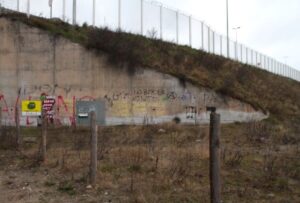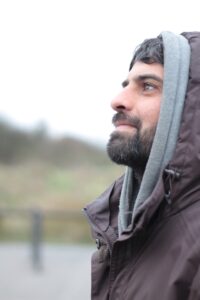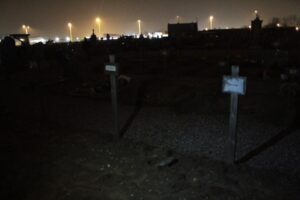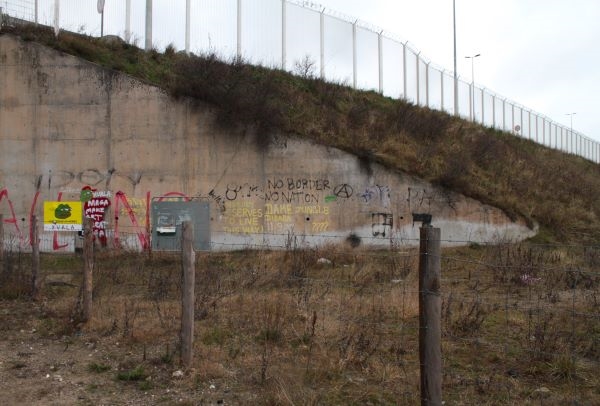Text and photos by Matthias Canapini* – Unimondo**
This sixth episode is set in Brussels, Belgium (read previous episodes here: first, second, third, fourth, fifth and sixth)
In February 2019, I spent a few weeks along the migrant route between Calais and Brussels. I share an excerpt from this choral narrative, collected between the docks and informal gatherings.

The foundations of the Gare du Nord in Brussels are full of huddled bodies. Half the world is waiting for passengers: Ghanaians, Tunisians, Malians, Afghans, Somalis, Kurds, Egyptians, and Eritreans. Laurent, 26, an anthropologist, says: “For those who are looking for a hook-up or who have run out of money, Brussels station is a good refuge, but unlike other Countries, there are no solidarity associations here, only the spontaneous support of citizens who take turns hosting refugees and migrants in their homes. It is impossible to say how many there are. After the expulsion from Calais, many of them came to Brussels, mainly Eritreans, Egyptians and Sudanese.”
We drink coffee with Abasi, hardly more than a teenager; our destinies cross by chance in a bar full of students. “I am from Guinea Conakry. When I was five years old, poverty forced my parents to entrust me to a paternal uncle. He turned out to be very violent. Twenty per cent of my body bears the scars of the burns he inflicted. A friend helped me to escape to Libya and then to Europe. I don’t want to talk about what happened in prison. At sea, we were picked up by the Aquarius ship of SOS Mediterranée and Médecins Sans Frontières, when we were already half drowned… The boat had capsized half an hour earlier. I crossed half of Europe by train, passing through Ventimiglia in May. When I arrived in Brussels, doctors examined my bones to see if I was a minor. I felt uncomfortable; it is another form of discrimination, just like fingerprints, a border within yourself. We have a border under our skin that nobody understands. Now I live in a reception centre with forty other unaccompanied minors, I go to a state school and for the last three months, I have been visiting a local family twice a week to practise my Belgian language. In the meantime, I am confidently waiting for the documents and humanitarian protection. All in all, things are going well, but I know that many people I know who have dramatic stories like mine don’t say anything to the commission, partly out of shame, dignity or fatalism. I have asked a psychologist to help me come to terms with my past… I have nightmares every night.”
“What does it mean to leave?” I ask Abasi, a mathematician who dreams of working for NASA and always wears red. “It means nostalgia. I didn’t want to leave Guinea, I was forced to. It is difficult to live in the West because you feel alienated, you are always thinking, you think a lot, you do little and you risk falling into depression. I am not a Dubliner, so as soon as I get my papers I will be free to travel. Here I survive and fortunately, as a minor, I get a minimal allowance, but it is never enough. Every day is a page of life, every page of a book. Climbing over the sad walls of man hides a secret: it allows you to discover that everything is connected and that you are another me or that the others are us. Already ready to leave.” I finally ask: “What do you think of walls, Abasi?” “The positive side of borders is that they protect against wars and persecution. It is a small part compared to the negative, because a border, however you see it, discriminates, you feel the deprivation of freedom on your skin. But borders are necessary”. From the Place de la Putterie, we can see the European flag dancing above the glass buildings.

“Belgium is a borderland. So what is a wall? What is the point of a society that militarises its borders when corruption reigns supreme? Why do we in Europe protest against borders but not against war?” asks Laurent as he accompanies me to the home of Valentine, one of the two hundred volunteers of the virtual platform Hébergement Plateforme Citoyenne. After an initial hesitation, she explains: “Thanks to word of mouth, a grassroots solidarity movement was born about two years ago to help migrants and refugees in transit. In November 2018, I wanted to do my part by hosting a very young Sudanese boy and later a couple from Eritrea. Hosting these people allows you to touch all the invisible nuances that the media doesn’t talk about. It is currently legal to host migrants in your home, but we know that this is no longer the case in France, and we fear that it will soon be the case here too. It is a pragmatic consequence of European xenophobic policies. I have met so many different people who have rediscovered themselves as communities in emergency hospitality: grandparents, young couples, bourgeois, proletarians, mechanics, and office workers. The important thing is to keep a low profile and to always avoid giving precise dates and addresses. We offer little: spices, clean sheets, a hot meal, and a chat. So many people join the network. Time passes and they, the migrants, become part of the family because it is one thing to follow immigration through a screen, it is another to find them at home on Christmas Day.”
Alain and Amèlie, two other volunteers, continue: “When we opened our house about two and a half years ago, the Hébergement Plateforme Citoyenne media platform did not yet exist. The first approach was to the female gender; we only started hosting for one night, but gradually we saw the same faces and exchanged phone numbers. We put in place various forms of support: those who did not have a place to stay, as members of the group, undertook to cook or transport the people concerned. Everything expanded with the creation of the platform. At first, there was a bit of fear, but we got to the point where we gave the children the keys to the house, with everything in it.”

Still asleep, Jumad descends the spiral staircase and takes a seat at the head of the table. A former Sudanese farmer, he is 32 years old and hails from the Nuba Mountains in South Kordofan. He has been living with the couple for exactly four months. “A decade-long war is raging in our mountains. The region is currently under the control of the central government, and a comprehensive peace agreement does not include ceding this territory to South Sudan. The ambiguity and increasing violence could turn a low-intensity war into a brutal conflict, as happened in Darfur in February 2003. On my way back to Europe I had to bypass Ventimiglia and Menton twice because the first time the Belgian government sent me back because of the fingerprints I had taken in Syracuse. They kept me in Milan for seven days, then I was free again: Nice, Marseille, Lyon, etc.
It took me days to get back to Belgium; the guards on duty asked me to show my ID and ticket, and the result was always the same: get off at the next stop or I’ll call the police. Except for the time when I fell asleep on the Brussels-Strasbourg line and the conductor woke me to find that we had already entered Luxembourg. I feared the worst! Instead, the man in uniform gave me a ticket to Arlon, the first Belgian city on the other side of the border”. Juma maintains the narrator’s cheerful impulse, sharing the escalation of unforeseen events as if they were frivolous pastimes. “I am very grateful to the people of Brussels. I have never felt such closeness, neither in Italy nor in France. One day I would like to do my bit to repay them”. “What would you like to do when you get to the UK?” asks Laurent, fascinated. “I want to become a cultural mediator to help migrants like me. I know what it is to suffer, what pain is. I have tested the madness of Libya on my skin… half of Africa is dying in Libya, where you work like a beast and get onions as a reward”. More than half of the thirty-six people hosted by Alain and Amèlie gradually arrived in Britain. Of all the souls who passed through, the Serbian couple remains an indelible memory. It was a moment of reunion to learn from Euronews that, despite the controls, a hundred migrants had illegally entered the port of Calais on the night of Saturday to Sunday. Some of them managed to take a ferry to England. The police arrested more than sixty people. The situation remained critical until Sunday morning when some of the migrants resisted police intervention by climbing onto a gangway of the boat.
* Matthias Canapini was born in Fano, central Italy, in 1992. He travels at a slow pace to tell stories with his notebook and camera. He has published five books since 2015 and is currently a news editor and reporter for the news outlet Unimondo
** Unimondo, founded on 10 December 1998 under the auspices of the Fontana Onlus Foundation, is an online news outlet dedicated to providing authoritative content on peace, sustainable human development, human rights and environmental issues. It offers diverse and timely information, amplifying the voices of different facets of Italian and global civil society. As the Italian hub of the OneWorld network, founded in London in 1995, it is part of a global network with 11 centres worldwide and 1,600 partner associations
























